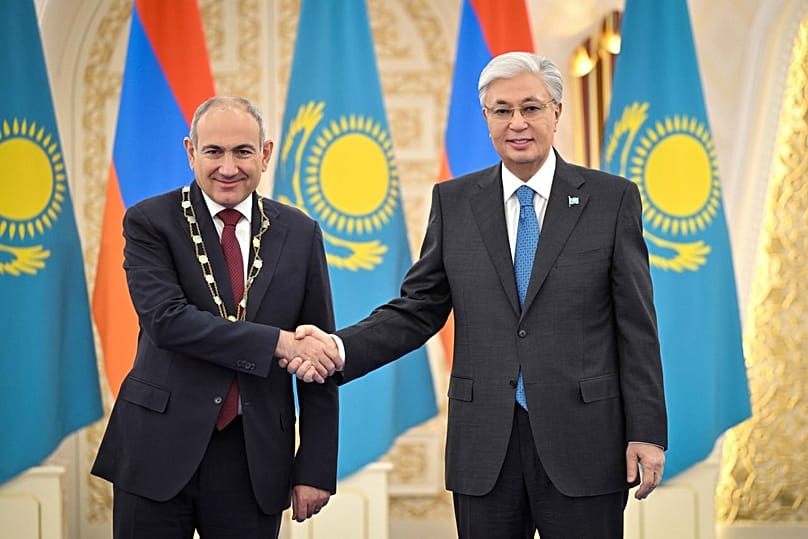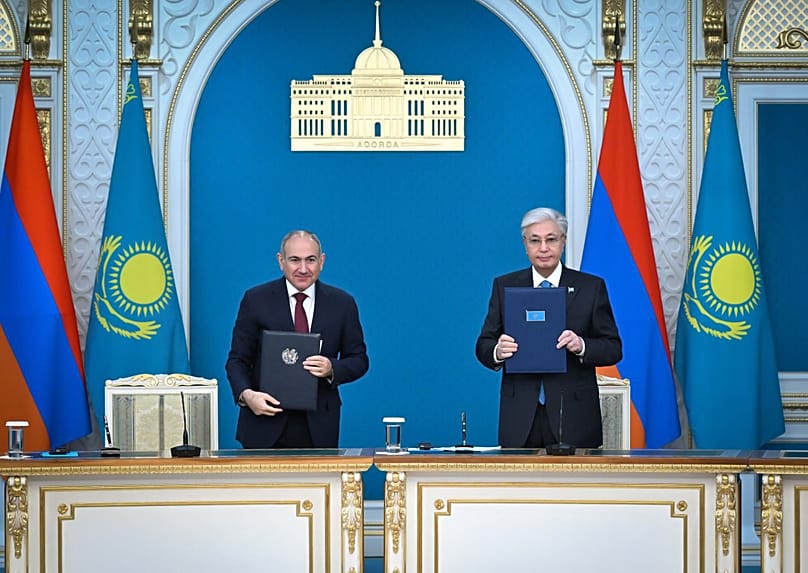Kazakhstan backed Trump Route for International Peace and Prosperity initiative during Armenia's Prime Ministers Nikol Pashinyan visit to Astana, highlighting the corridor’s role in diversifying regional transport routes.
Kazakhstan expressed its support for the Trump Route for International Peace and Prosperity (TRIPP) and Armenian Crossroads of Peace initiative during Armenian Prime Minister Nikol Pashinyan's visit to its capital Astana.
“We also confirm our interest in participating in the TRIPP project. Connecting these strategic corridors with the Trans-Caspian International Transport Route (TITR) and the North-South Corridor is in the interests of both countries,” Tokayev said.
For Kazakhstan, the route, also referred to as the Zangezur Corridor by Azerbaijan and Turkey, is a way to diversify its transport routes.
“The Zangezur Corridor is primarily about diversifying,” said Deputy Prime Minister and Minister of National Economy Serik Zhumangarin on the sidelines of the visit.
“Previously, we went through Azerbaijan to Georgia's Black Sea ports, but this route will allow us to reach Nakhchivan and then directly Turkey. There is also a route through Iran, but it’s not used as much.”
During talks with his Kazakh counterpart, Pashinyan thanked Kazakhstan for hosting the meeting between the Armenian and Azerbaijani foreign ministers in Almaty, which helped lay the groundwork for the 8 August peace agreement.
“Those negotiations were very important for further developments. It is also no secret that the peace established between Armenia and Azerbaijan is based on the Almaty Declaration,” said Pashinyan.
He noted that as a result of the Washington Declaration, Armenia is now concentrating on advancing the Trump Route project and is engaged in active negotiations with the US to clarify and finalise the legal framework and regulations.
“This is indeed a very solid foundation for a lasting, stable and reliable peace, and we, of course, should make efforts to sign and ratify the peace agreement in the near future,” he said.
The prime minister also highlighted the benefits TRIPP will bring to bilateral trade between Kazakhstan and Armenia, as well as the expanded export opportunities “in the case of Armenia, to the east, in the case of Kazakhstan, to the west.”
The leaders also celebrated the first shipment of 1,000 tonnes of grain from Kazakhstan to Armenia.
The joint statement signed by the two countries elevated their relationship to the level of a strategic partnership.
The official delegations signed 15 agreements and memorandums, and discussed the possibility of reopening an air connection between the countries and establishing a Kazakh-Armenian Business Council.
Trade, transit, investment cooperation, subsoil use, agriculture, digitalisation, AI, healthcare and cultural and humanitarian ties were also part of the agenda.
Armenia-Azerbaijan peace agreement
On 8 August, with mediation by US President Donald Trump, Pashinyan and Azerbaijan’s President Ilham Aliyev signed a joint declaration to finalise a peace agreement aimed at ending the Nagorno-Karabakh conflict.
Although an important step, the agreement requires ratification and changes in the Armenian legislature.
Another major element of the agreement involves building a transport link, TRIPP, connecting mainland Azerbaijan with its Nakhchivan exclave, which is separated by a 44 km stretch of Armenian land.
The route would remain under Armenian sovereignty and operate under Armenian law, but the US would receive exclusive development rights for 99 years.
Beyond its immediate purpose, the project would enable the movement of people and goods from Europe to Azerbaijan and the wider Central Asian region without passing through Russia or Iran.
Both Iran and Russia criticised Washington’s role in the proposed TRIPP initiative. Iran is unhappy with the disruption of its connection to Armenia, while Russia may lose its influence in the South Caucasus.
Involving the US is also intended to prevent the Azerbaijan-Turkey tandem from gaining control of the border and cutting Armenia off from Iran.













